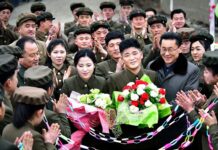The North Korean authorities have apparently begun to forcibly relocate some of the families of defectors in Yangkang Province to remote rural areas.
A source from the area revealed the news on March 31st, saying, “The rumor that a policy of forcibly relocating the families of defectors had been handed down was always around, but then on the 28th two households really were forced to leave.”
He explained, “Agents from the People’s Safety Ministry arrived unannounced, got the families to pack a few simple things and then took them away by truck.”
North Korea Intellectuals Solidarity (NKIS) reported the existence of the policy first back on March 18th, stating, “The North Korean authorities have handed down a decree ordering the deportation of families which have family members or relatives who have defected to South Korea or are missing persons.”
The Daily NK source said the effect of the policy has been strongly felt, explaining, “Since those who disappeared in the night were all good people, their neighbors really miss them. The story has spread like wildfire to other cities, too; therefore, the residents of Hyesan, which is a city where so many defector families live, are very worried.”
Although nobody knows exactly where the families have been taken, it is likely to have been a remote mountainous location in order to prevent them from spreading information on the outside world and at the same time allow for easy monitoring.
One rumor is that they are now living in a village in the Yoopyong Labor District of Baekam inYangkang Province, where the Yoopyong Forestry Office is stationed. However, other inside source have refuted that idea, pointing out that the village in question is reasonably accessible and equipped with a decent transportation system.
The source said of the policy, “The authorities seem to have implemented the migration policy because defector families are able to get information on the outside world, like the Libyan rebellion etc, via telephone calls to receive money from family in South Korea or China.”
Another source from the same province even mentioned rumors of a camp for the families, saying, “An operation to force them into leaving their places has just begun in this neighborhood. Since there is a rumor circulating that a camp just like Yoduk has been built, households whose sons and daughters have gone to the South are now quivering with anxiety.”
The source, citing a People’s Safety Ministry agent, explained, “There are more than one thousand households on the list of targets for removal to remote areas.” The source said he asked the agent, “Surely the authorities will not try to send so many people to other places?” but the agent replied, “The decree is powerful, so they will do it.”
The source went on, “According to the agent, Kim Jong Eun’s words were, ‘Just the 3.5 million core members of the Party and nuclear weapons will do. I have no thoughts of conducting the revolution with betrayer families.’” That being the case, the source suggested that the policy may well be implemented nationwide.
Naturally, defectors in South Korea are concerned. One, Kim, who came to the South in 2008, told The Daily NK, “I am worried about my family. If they are sent to that kind of area, I will have to live with a sense of guilty for my rest of life. I will bring them to the South as soon as I have raised the money.”
It seems likely that the policy will also prompt a lot of fresh defections for those living in fear but, for now, living in relatively accessible areas.
As of the 31st, no information on the policy had been received from outside Yangkang Province.
In 2001 there was a case where 50 households containing defectors were deported from a city in North Hamkyung Province, and the households of those with politically weak backgrounds have been unwelcome in Pyongyang since the 1970s, but it will be unprecedented if this policy is really implemented on a grand scale.



















